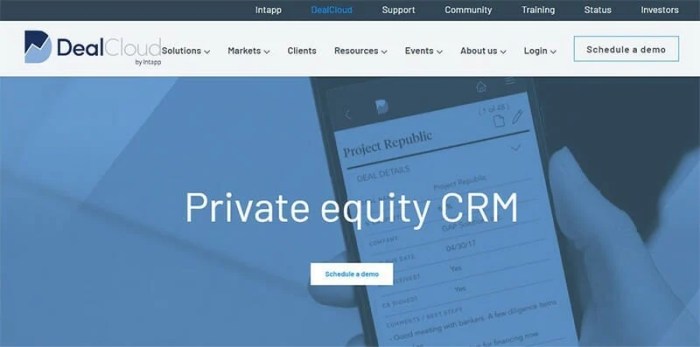Best crm software for private equity – Private equity firms manage complex relationships with portfolio companies, limited partners (LPs), and other stakeholders. Efficiently managing these interactions is crucial for success. A robust Customer Relationship Management (CRM) system is no longer a luxury but a necessity. This guide explores the best CRM software solutions tailored to the unique needs of private equity firms, considering factors like deal flow management, portfolio company oversight, investor relations, and reporting.
Understanding the Unique CRM Needs of Private Equity
Private equity operations differ significantly from other industries. A successful CRM for private equity must go beyond basic contact management. Key requirements include:
- Deal Flow Management: Tracking potential investments, managing due diligence, and monitoring deal progress.
- Portfolio Company Management: Monitoring key performance indicators (KPIs), facilitating communication, and managing board meetings.
- Investor Relations: Maintaining strong relationships with LPs, providing regular updates, and managing capital calls.
- Reporting and Analytics: Generating insightful reports on investment performance, portfolio company performance, and investor relations.
- Security and Compliance: Ensuring data security and compliance with industry regulations (e.g., GDPR, CCPA).
- Integration Capabilities: Seamless integration with other essential tools like financial modeling software and accounting systems.
Top CRM Software Options for Private Equity
Several CRM platforms offer features specifically designed for private equity. Choosing the right one depends on your firm’s size, specific needs, and budget. Below are some leading contenders:
1. Salesforce
Salesforce, a market leader in CRM, offers robust features and customization options. Its platform can be tailored to manage the entire investment lifecycle, from sourcing deals to portfolio company oversight. Salesforce’s AppExchange offers numerous add-ons to enhance functionality for private equity specific needs. However, it can be expensive and require significant implementation time.
2. Microsoft Dynamics 365
Microsoft Dynamics 365 provides a comprehensive suite of applications, including CRM capabilities. Its integration with other Microsoft products like Excel and Outlook is a significant advantage. It offers a good balance between functionality and cost-effectiveness, making it suitable for firms of various sizes. However, customization might require specialized expertise.
3. HubSpot
HubSpot, known for its inbound marketing capabilities, also offers robust CRM functionality. While perhaps less feature-rich than Salesforce or Dynamics 365 for complex private equity needs out-of-the-box, its ease of use and affordability make it an attractive option for smaller firms or those prioritizing streamlined workflows. Its strong reporting and analytics features are also beneficial.
4. DealCloud, Best crm software for private equity
DealCloud is a purpose-built CRM specifically designed for private equity and other alternative investment firms. It offers specialized features for deal flow management, portfolio company monitoring, and investor relations. Its focus on the industry makes it highly efficient for managing complex transactions and relationships. However, it may be more expensive than general-purpose CRMs.
5. iLevel
iLevel is another specialized CRM solution catering to the needs of private equity firms. It provides a comprehensive platform for managing the entire investment lifecycle, including deal sourcing, due diligence, portfolio management, and investor reporting. Its strong focus on data security and compliance is a key advantage. Pricing is typically tailored to the specific needs of the firm.
Key Features to Look for in a Private Equity CRM
When selecting a CRM, consider these essential features:
- Deal Management: Comprehensive tracking of deal progress, from initial sourcing to closing.
- Portfolio Company Management: Monitoring KPIs, managing communications, and scheduling board meetings.
- Investor Relationship Management (IRM): Maintaining communication with LPs, providing regular updates, and managing capital calls.
- Reporting and Analytics: Generating customized reports on investment performance, portfolio company performance, and investor relations.
- Document Management: Secure storage and easy access to all relevant documents.
- Security and Compliance: Robust security measures and compliance with industry regulations.
- Integration Capabilities: Seamless integration with other essential tools.
- Scalability: Ability to adapt to the firm’s growth and changing needs.
- User-Friendliness: Intuitive interface for easy adoption by all users.
Choosing the Right CRM: A Step-by-Step Approach: Best Crm Software For Private Equity
- Assess your firm’s needs: Identify your key requirements and prioritize features.
- Research different CRM options: Compare features, pricing, and reviews.
- Request demos: Test drive the software and assess its usability.
- Consider integration with existing systems: Ensure seamless data flow.
- Evaluate security and compliance features: Prioritize data protection.
- Factor in implementation costs and ongoing maintenance: Develop a realistic budget.
- Get user buy-in: Ensure your team is comfortable with the chosen system.
Frequently Asked Questions (FAQ)
- Q: What is the average cost of a private equity CRM? A: The cost varies greatly depending on the features, number of users, and chosen vendor. Expect to pay anywhere from a few hundred dollars per month to several thousand dollars per month for enterprise-level solutions.
- Q: How long does it take to implement a private equity CRM? A: Implementation time depends on the complexity of the system and the firm’s specific needs. It can range from a few weeks to several months.
- Q: Can a CRM improve investment returns? A: While a CRM doesn’t directly guarantee higher returns, it can significantly improve operational efficiency, leading to better decision-making and improved portfolio company performance, which can indirectly contribute to better returns.
- Q: What are the key metrics to track in a private equity CRM? A: Key metrics include deal flow, investment performance, portfolio company KPIs, investor satisfaction, and operational efficiency.
- Q: Is cloud-based CRM better than on-premise? A: Cloud-based CRMs offer greater flexibility, scalability, and accessibility, often making them the preferred choice for private equity firms. However, on-premise solutions might be considered for firms with stringent security requirements or concerns about data sovereignty.
Resources
Call to Action
Choosing the right CRM is a crucial step in optimizing your private equity firm’s operations. Contact us today to discuss your specific needs and explore the best CRM solution for your firm.
Questions and Answers
What are the key features to look for in a private equity CRM?
Key features include robust contact management, deal tracking capabilities, reporting and analytics dashboards, document management, and seamless integration with other financial software.
How much does private equity CRM software typically cost?
Pricing varies widely depending on the features, number of users, and vendor. Expect to see a range from subscription-based models with tiered pricing to more expensive enterprise solutions.
What are some examples of popular private equity CRM systems?

Source: softwareglimpse.com
Several platforms cater to private equity, including Salesforce, Microsoft Dynamics 365, and specialized solutions designed specifically for the industry. Research is needed to determine the best fit.

Source: founderjar.com
How can I ensure data security with a private equity CRM?
Prioritize vendors with robust security protocols, including data encryption, access controls, and compliance with relevant regulations like GDPR and CCPA.
